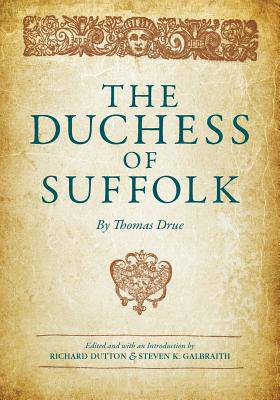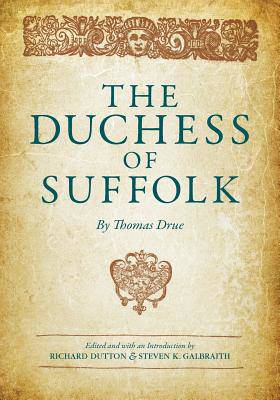
- Retrait gratuit dans votre magasin Club
- 7.000.000 titres dans notre catalogue
- Payer en toute sécurité
- Toujours un magasin près de chez vous
- Retrait gratuit dans votre magasin Club
- 7.000.0000 titres dans notre catalogue
- Payer en toute sécurité
- Toujours un magasin près de chez vous
Description
With the inaugural edition of the Early Modern Drama Texts series, Richard Dutton and Steven K. Galbraith illuminate the only surviving work of playwright and actor Thomas Drue. First performed by the Palsgrave's Men at the Fortune Theater in 1624, The Duchess of Suffolk dramatizes the exile of Protestant noblewoman Katherine Willoughby (1519-80) during the reign of Catholic Queen Mary I (1516-58). Drawing from popular accounts in works by John Foxe and Thomas Deloney, Drue created a narrative of exaggerated peril, as the Duchess and her companions are chased across the continent. The embellished history evokes many iconic figures of the Reformation, from the celebrated Oxford Martyrs Hugh Latimer, Thomas Cranmer, and Nicholas Ridley to Bishop Edmund Bonner, whose infamous reputation had earned him the soubriqet "bloody Bonner." A tragicomic history, The Duchess of Suffolk still resonated when it was written and performed in early seventeenth-century England some seventy years later. With this volume, Dutton and Galbraith provide a critical apparatus that situates The Duchess of Suffolk in historical context and suggests an explanation for its continued resonance. They account for the play's censorship in 1624 by detailing how it evoked contemporary parallels to the controversial foreign policy of King James I. More specifically, the editors offer an introduction that includes a historical overview of the author, staging, printing, and reception. Facing facsimiles of the original are pages with the updated text, complete with annotations to clarify language and staging details. This edition of The Duchess of Suffolk will have something to offer to early modern drama scholars as well as scholars of book history.
Spécifications
Parties prenantes
- Auteur(s) :
- Editeur:
Contenu
- Nombre de pages :
- 188
- Langue:
- Anglais
- Collection :
Caractéristiques
- EAN:
- 9780814252208
- Date de parution :
- 31-12-16
- Format:
- Livre broché
- Format numérique:
- Trade paperback (VS)
- Dimensions :
- 178 mm x 254 mm
- Poids :
- 335 g

Les avis
Nous publions uniquement les avis qui respectent les conditions requises. Consultez nos conditions pour les avis.






